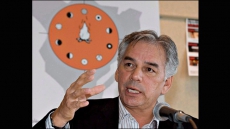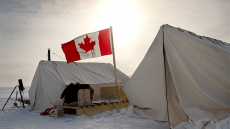Quebec's rookie premier, Philippe Couillard, made his presence felt at his first meeting with Canada's other premiers, agreeing Friday to have his province join in the development of a national energy strategy that had been stalled by a previous separatist government.
Couillard, among 13 provincial and territorial leaders attending an annual meeting in Charlottetown, said at the conclusion of the conference that he had concerns about joining the Canadian Energy Strategy, which has been championed by Alberta for years.
However, he said the other premiers were quick to address his questions about jurisdiction and the strategy's link to climate change.
"We had excellent collaboration from all our colleagues," Couillard told a news conference, where several premiers waxed eloquent about working with the mild-mannered, federalist premier.
"Having all provinces involved, strengthens our individual provinces and the country," said Ontario Premier Kathleen Wynne.
Couillard stressed that the strategy has to focus on the impact of climate change.
The document's objectives specifically state that the strategy must be "consistent with efforts to reduce greenhouse gas emissions" and "addressing climate change and moving toward a lower carbon economy" through carbon pricing and carbon storage.
"For Canadians, on top of having a greater guarantee of a sustainable environment, it's also that we want Canadians to have access to energy of all kinds," Couillard said. "We made the essential link between the environment and an energy strategy."
P.E.I. Premier Robert Ghiz, the host of the conference, said a final draft of the strategy would be completed before the premiers meeting next summer.
British Columbia Premier Christy Clark had initially balked at signing on, but agreed to take part last November after agreeing that none of Alberta's royalties from oil pipelines will be going into B.C. coffers.
Clark was effusive in her praise for Couillard, saying Quebec's decision to sign on was a "watershed moment."
"Quebecers need and deserve to have a voice at the national table in shaping the policy of this country," she said. "Equally, every Canadian benefits when the voice of Quebec is heard loudly and clearly, as it is now."
Clark then shifted gears and talked about how the strategy will benefit British Columbia, which is keen to export energy from its large natural gas reserves in the province's northeast.
Manitoba Premier Greg Selinger said Quebec's involvement amounts to a "gigantic difference" because, like Manitoba, Quebec has a massive hydroelectric industry to draw from.
"Quebec and Manitoba energy exports displace millions of tonnes of carbon emissions from other sources of energy in other jurisdictions," Selinger said.
Alberta Premier Dave Hancock also said the strategy's benefits would extend beyond Canada's borders.
"We actually add value with technology, with innovation in global reductions in other jurisdictions," he said. "It's not all about what we're doing at home."
Ghiz also noted that Quebec had joined a committee on health-care innovation, changing its status from observer to permanent member.
Earlier in the day, Clark announced that Saskatchewan had agreed to drop trade barriers that kept B.C. wine and craft spirits from being sold in that province. British Columbia already allows other provinces to sell wine in the province.
Clark said she expects Ontario to open its borders to B.C. wine within a few months.
"I'm hopeful that by the next meeting of Canada's premiers, Canada's borders will be open for wine right across this country," Clark said.
British Columbia's deal with Saskatchewan will allow consumers in both provinces to order B.C. or Saskatchewan wines and craft spirits directly from producers and have them delivered to their homes. British Columbia has already struck similar deals with Manitoba and Nova Scotia.
The annual meeting of premiers next year will be held in Newfoundland and Labrador.





